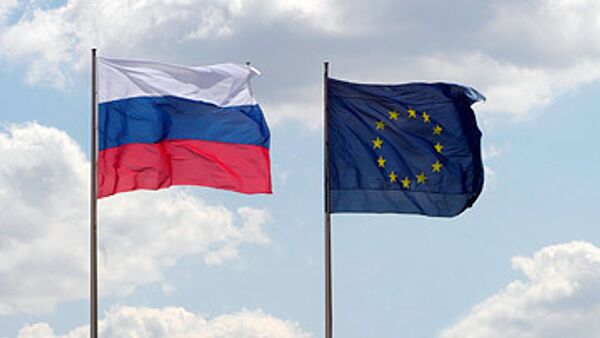MOSCOW. (Mikhail Rostovsky for RIA Novosti) - Relations between Russia and the European Union remain an uphill struggle. Russian President Dmitry Medvedev thought hard before agreeing to attend the Russia-EU summit in Stockholm on November 18.
"It was a difficult decision for Russia. Moscow was not sure this summit would be productive," said presidential aide Sergei Prikhodko.
His skepticism could be explained by the Swedish foreign minister's recent and alarming statements about Russia, but this is most likely only the tip of the iceberg. More to the point, Russia and the EU have nothing to talk about now.
Differing values are not the only root of the evil. The EU countries have agreed on the new structure of the European Union, but they are still divided over their policies regarding Russia.
Karsten Voigt, coordinator of German-American Cooperation at the German Foreign Ministry, said at a roundtable in Berlin in June 2009 that 87% of the German elite had a negative attitude toward Russia's policies. At the same time, 61% of the respondents said Russia was a crucial partner, and 76% admitted that the proposed Nord Stream gas pipeline would strengthen their energy security.
To some Eastern European politicians, these figures are like waving a red cape in front of a bull. One would think that time would have softened the bad feelings from the socialist bloc years. Unfortunately, these feelings are only growing stronger and for psychological rather than political reasons. Confrontation with Russia has become a source of a national unity for the political leadership of countries like Poland.
If you want to find common ground with a German diplomat or politician, throw him a couple of lines about how "absolutely impossible" Poles are. Both us and many of Warsaw's allies in Western Europe have long been fed up with its ambitions and increasing demands.
Russia thinks nothing of public quarrels with its CIS partners, while the leaders of the old EU countries, although they may be furious, still prefer to search for compromise. No matter how contentious Poland can be, it is still a better partner for the other EU countries than Russia.
As Jack London said in one of his stories, "A boat divided against itself won't float." Russia sometimes benefits from the EU's inability to coordinate a common policy toward it. European politicians threatened Russia with hell and damnation after the August 2008 war with Georgia, but they did nothing in the end.
On the other hand, the EU's inability to punish Russia also means that it cannot do anything nice for us either. Moscow has no choice but to rely on bilateral cooperation with individual EU member countries. This is not bad, but it cannot be regarded as a cause for optimism either.
One can speak at length about the decline of Europe and the unlikelihood of the EU accepting new members in the foreseeable future. But where there is a will, there is a way, and in 20 or 30 years the EU's external borders may well run close to Russia's Smolensk and Belgorod.
Ukraine's Viktor Yanukovych, Yulia Tymoshenko and Viktor Yushchenko very seldom agree with each other, but they are equally enthusiastic about "European integration." Belarus' high-level politicians behave likewise. When Belarusian President Alexander Lukashenko eventually leaves, we may see Belarus march happily toward the West.
The only issue on which the EU and Russia engage in a dynamic dialogue is energy. Moreover, describing their interaction as dialogue is stretching the point. It is more a classic conflict between a monopoly buyer and a monopoly seller, with Russia always on the defensive. The EU acts on the premise "Russia is dangerous and unreliable; we fear you" in trying to hobble the Russian bear and deprive it of even a theoretical opportunity to teach Europe what's what.
Playing with pipelines and counter-pipelines may be interesting. To Russian leadership, it has become the kind of Big Game Russia and Britain played for domination in Central Asia in the 19th century. But if Russia limits its activities to pipelines, it may eventually become the "raw materials appendage" of the world.
The perennial Russian question "What is to be done?" is not imperative for Russia-EU relations. Russia's long-term strategic interests call for developing a close partnership with the European Union. Only in this way can we continue to live as good neighbors with Ukraine and Belarus and develop a modern economy.
The new Russian question should be "How can this be done?". Unfortunately, neither Moscow nor Brussels have the answer.
Mikhail Rostovsky is a commentator of Moskovsky Komsomolets.
The opinions expressed in this article are the author's and do not necessarily represent those of RIA Novosti.



